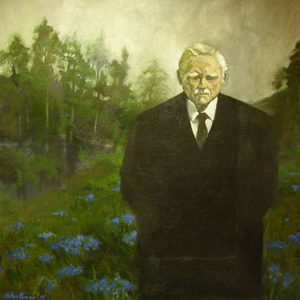
A remarkable passage from page 88 of The Abundance of the Heart (Salt Lake City: Bookcraft, 1986), by Arthur Henry King:
My first real discovery of nature in life came one morning in April 1916. My father put me on the back of his bike, where I had a little seat, and said, “Off we go.” And then he turned in the wrong direction for I thought he was taking me down to Quakers’ meeting — it was a Sunday. “No,” he said, “we are going somewhere else today.” And we rode for about eight miles, and we stopped at a wood. . . . We went into the wood; and there, suddenly, was a great pool of bluebells stretching for perhaps a hundred yards in the shade of the oak trees. And I could scarcely breathe because the impression was so great. The experience then was just the bluebells and the scent; now, when I recall it, it is also the love of my father who chose to do that that morning — to give me that experience. I am sure he had been there the day before, found it, and thought, “I’ll take my son there.” As we rode there and as we rode back, we heard the distant thud of the guns at the Battle of the Somme, where thousands were dying every day. That overwhelming experience of a natural phenomenon, a demonstration of beneficent creation, and at the same time hearing those guns on the Somme — that experience has remained with me almost more clearly than anything else in my life.
Incredibly, sounds from the Battle of the Somme, a horrific and catastrophic episode of the First World War in France that lasted from 1 July 1916 until 18 November 1916, could actually be heard across the English Channel in Great Britain.
***
We seldom think about World War One these days, but it serves powerfully to illustrate the evil that fallen humanity brings upon itself, as well as our desperate need for help. Roughly ten million soldiers died in the conflict, and about seven million civilians.
In this context, I think of Wilfred Owen’s famous poem “Dulce et Decorum Est,” which closes with a quotation from the Roman poet Horace: “It is sweet and fitting to die for one’s country.” Owen himself was killed in action on 4 November 1918 at the age of twenty-five, during the crossing of the Sambre–Oise Canal — exactly a week (almost to the hour) before the signing of the Armistice that ended the war.
The inscription on Wilfred Owen’s gravestone in northern France was based by his mother on a passage in one of his poems:
Shall life renew these bodies? Of a truth all death will he annul.










